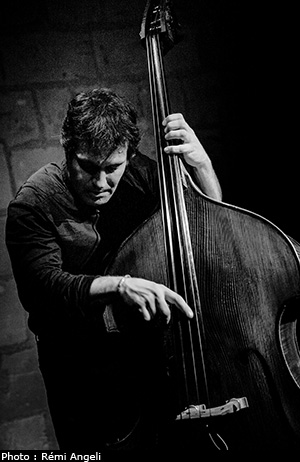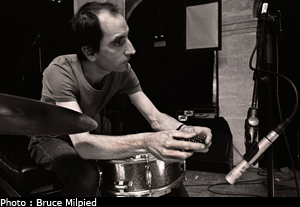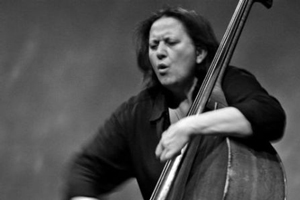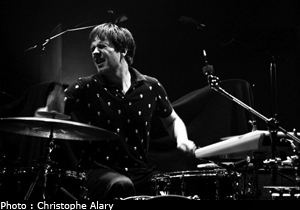(Français) artiste-old
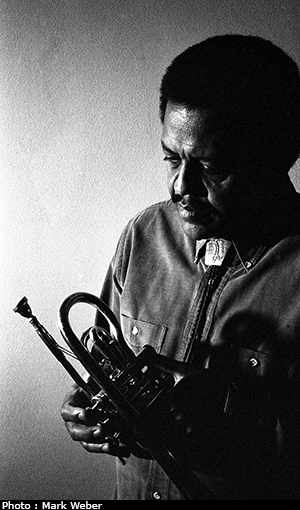
Bobby Bradford grew up in Dallas, playing trumpet locally with such local players as Cedar Walton and David Newman.
In 1953, he moved to Los Angeles where he met and played with Ornette Coleman and Eric Dolphy. Bradford spent time in the military and in school before becoming Don Cherry’s replacement with the Ornette Coleman Quartet in 1961-1963, a period when the group unfortunately rarely worked.
After moving to Los Angeles, Bradford became a school teacher and also began a longtime association with clarinetist John Carter; his mellow trumpet blended in well with Carter’s dissonant flights.
He recorded with Ornette Coleman in 1971, but otherwise is best known for his playing and recordings with Carter.
Since the clarinetist’s death, Bradford frequently led a quintet (the Mo’tet) featuring Vinny Golia and occasionally Marty Ehrlich. In the ’90s, he also performed with John Stevens’ Freebop, the David Murray Octet, and Charlie Haden’s Liberation Music Orchestra.
Scott Yanow – All Music Guide
NO U-TURN – Live in Pasadena, 1975 DT(RS)05
• • • • • • • • • • • • • • • • • • • • • • • • • • • • • • • • • • • • • • • • • • • •
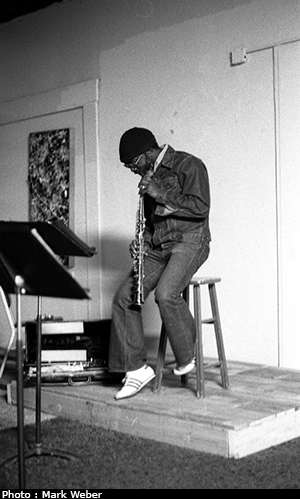
John Wallace Carter was born in Fort Worth, Texas, on September 24, 1928, and was a childhood friend of Coleman and drummer Charles Moffett. He earned a bachelor’s degree in music education from Lincoln University in Jefferson City, Missouri in 1949, and a master’s degree from the University of Colorado in 1956. He taught in public schools in both Fort Worth then moved Los Angeles in 1961, where, with Coleman’s encouragement he formed a band, the New Art Jazz Ensemble (NAJE), with trumpeter Bobby Bradford in 1964.
Carter conducted orchestral versions of Coleman’s work at UCLA in 1965, and he was initially a follower of the saxophonist’s “harmolodic” approach to composition and improvisation. On the NAJE’s 1969 album Seeking, he demonstrates great facility on alto and tenor saxophones, as well as clarinet.
The NAJE continued as a group until 1974 and released a total of four albums on the Revelation and Flying Dutchman labels. After the NAJE disbanded Carter played clarinet exclusively, and progressively came into his own voice as an improviser and composer.
In the late 1970s, he played in a group called Wind College with flutist James Newton and bassist Red Callender, and was the subject of a documentary, The New Music: Bobby Bradford and John Carter in 1980. He played at clubs and festivals in Europe and the United States, both as a leader and as a sideman, with groups that frequently included Bradford, Newton, and Roberto Miguel Miranda. In the 1980s he led the clarinet quartet Clarinet Summit, with Alvin Batiste and Jimmy Hamilton and with David Murray on bass clarinet. As an improviser, Carter came to share affinities with the work of other free-jazz clarinetists, such as Perry Robinson and Theo Jörgensmann.
In the 1980s, Carter focused increasingly on composition, starting with Dauwhe, an octet he recorded in 1982. The piece would become the first part of Roots and Folklore, and reveals his evolving approach to both instrumentation and creative improvisation. With focused interplay and overlapping of tones and ideas, Carter’s clarinet takes an omnipresent position.
Carter and Bradford’s musical relationship was not unlike that of Coleman and Cherry in their pianoless quartet. In this setting, Carter and Bradford embrace the composition’s pastoral, evocative voices of tribal Africa while the sleekness and idiosyncratic horns swirl like apparitions above the manic, even brooding rhythm. Both experimental, yet familiar, Dauwhe augurs many of the ideas Carter later explored in the remaining volumes of his history: clashing cultures, forces of myth and predation, lust, and unadulterated beauty amid the chaos. Neither free music nor swing, this album shows elements of both, and has layers of ensemble work similar to massive conductions of Butch Morris.
Carter’s compositions, intriguing in their varied instrumentation, draw on the folk wisdom of country blues, the sophisticated dances of swing, the figured bass of bebop, and the violent clashes of free jazz, all combined in careful doses. The five parts of Roots and Folklore explore deep feelings about the African diaspora, starting with Dauwhe, named for an African goddess of happines. This is followed by meditations on imprisonment in Castles of Ghana, the middle passage on Dance of the Love Ghosts, chattel slavery on Fields, and the youthful exuberance of Harlem between the World Wars in Shadows on a Wall. The works vary in instrumentation, and are both expressionistic and impressionistic.
Carter employed equal parts roots and folklore in his explorations of African-American historyhis attachments to what came before looks forward in both style and quality of style. Carter’s work is articulate and allows for a sinister wilderness to penetrate even his most designed pieces, all of which are a statement about Africans who became African-Americans, and the immense losses in between.
John Carter, recorded the final chapter of Roots in 1989, and died of lung cancer in Los Angeles on March 31, 1991.
NO U-TURN – Live in Pasadena, 1975 DT(RS)05
• • • • • • • • • • • • • • • • • • • • • • • • • • • • • • • • • • • • • • • • • • • •
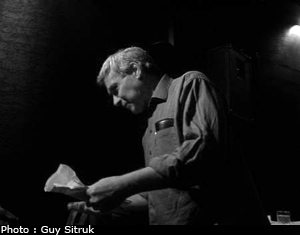
Steve Dalachinsky was born in 1946, Brooklyn, New York right after the last big war and has managed to survive lots of little wars.
His work has appeared extensively in journals on & off line including; Big Bridge, Milk, Tribes, Unlikely Stories, Ratapallax, Evergreen Review, Long Shot, Alpha Beat Soup, Xtant, Blue Beat Jacket, The Brooklyn Review.
He is included in such anthologies as Beat Indeed, The Haiku Moment, Up is Up But So is Down: NYU Downtown Literary Anthology, the Unbearables anthologies: Help Yourself, The Worse Book I Ever Read and The Big Book of Sex (of which he is a co-editor) and the esteemed Outlaw Bible of American Poetry.
He has written liner notes for the CDs of many artists including Anthony Braxton, Charles Gayle, James “Blood” Ulmer, Rashied Ali, Roy Campbell, Matthew Shipp and Roscoe Mitchell.
His 1999 CD, Incomplete Direction (Knitting Factory Records), a collection of his poetry read in collaboration with various musicians, has garnered much praise. His chapbooks include Musicology (Editions Pioche, Paris 2005), Trial and Error in Paris (Loudmouth Collective 2003), Lautreamont’s Laments (Furniture Press 2005), In Glorious Black and White (Ugly Duckling Presse 2005), Dream Book (Avantcular Press 2005), Christ Amongst the Fishes (A book of collages, Oilcan Press 2009), Insomnia Poems (Propaganda Press 2009), Invasion of the Animal People (Propaganda Press 2010), The Mantis: collected poems for Cecil Taylor 1966-2009 (Iniquity Press 2011), Trustfund Babies (Unlikely Stories Press The Veiled Doorway & St. Lucie (Unarmed Press 20012) and Long Play E.P. (Corrupt Press, 2012).
His book The Final Nite (complete notes from a Charles Gayle Notebook, Ugly Duckling Presse 2006) won the 2007 Josephine Miles PEN National Book Award.
His most recent books are Logos and Language, a collaboration with pianist Matthew Shipp (RogueArt 2007), Reaching into the Unknown, a collaborative project with French photographer Jacques Bisceglia (RogueArt 2009).
In 2005 he recorded Phenomena of Interference, a collaboration with pianist Matthew Shipp (Hopscotch Records).
He has read throughout the N.Y. area, the U.S., Japan and Europe, including France and Germany. He is a contributing writer to the Brooklyn Rail.
His book A Superintendent’s Eyes (Hozomeen Press 2000) is being reissued by Autonomedia/Unbearables in an expanded/revised edition in late fall 2012.
His latest cds are collaborations with saxophonist Dave Liebman, bassist Joëlle Léandre and an experimental French rock Group the Snobs.
THE BILL HAS BEEN PAID (DT 03)
• • • • • • • • • • • • • • • • • • • • • • • • • • • • • • • • • • • • • • • • • • • •
Early on, in his family, he would hear music – jazz. He attends conservatory and is taught piano and clarinet, then double bass under the direction of Jean-François Jenny-Clark and Bernard Cazauran.
Out of adolescence: “Music and arts as a way of being”. He’s working with Gaël Mevel and Thierry Waziniak before joining Octopus with Benoist Raffin and Jobic Le Masson whom he meets in 1993 in Slovakia. From then on, he will relentlessly go from a project to another, from a meeting to another with numerous musicians: free jazz, european improv… In his works, he intends to shape time. He’s known today as a very active improviser and composer of electroacoustic music in various contexts, medias and means of expression (music, dance, theatre, image…).
Improvised in France and Europe with… (among many) Jean-Luc Guionnet, Edward Perraud, Tom Chant, Bertrand Denzler, Michel Doneda, Oliver Lake, Didier Lasserre, Stéphane Rives, Joëlle Léandre, Henry Grimes, Roy Campbell, Jean-Luc Cappozzo, Mario Rechtern, Eric Zinman, Jobic Le Masson, Sunny Murray, Daunik Lazro, Itaru Oki, Hasse Poulsen, Makoto Sato, Rasul Siddik, Christine Wodrascka, Hilary Jeffery, Jack Wright.
http://benjamin.duboc.free.fr/
POURTANT LES CIMES DES ARBRES (DT 01)
EN CORPS (DT 02)
SENS RADIANTS (DT 04)
• • • • • • • • • • • • • • • • • • • • • • • • • • • • • • • • • • • • • • • • • • • •
Born in Bordeaux, France, march 1971. Started the drums at the age of sixteen, in order to live «something else ». After learning some drums rudiments in the local music school, he works essentially in autodidact, in order to find his own voice, based on a poetic approch. He teaches drums & leads improvision’ workshop & master-classes. Works with painting, poetry, dance, super8 movies, photography. Co-creates Amor fati label with Mathieu Immer.
He uses to play with Beñat Achiary, Benjamin Duboc, Jean-Luc Guionnet, Seijiro Murayama, Laurent Pascal, Steve Dalachinsky, Joëlle Léandre, Michel Doneda, Mathias Pontévia, Niklas Barnö, Joel Grip, Daunik Lazro, Jobic Le Masson, Abdelhaï Bennani, Alan Silva, Edward Perraud, Sylvain Guérineau, Jean Rougier, Eric Zinman, Jean-Luc Capozzo, Itaru Oki, Rasul Siddik, Makoto Sato, Sabir Mateen.
http://didierlasserre.free.fr/
http://didierlasserre.wordpress.com
POURTANT LES CIMES DES ARBRES (DT 01)
SENS RADIANTS (DT 04)
• • • • • • • • • • • • • • • • • • • • • • • • • • • • • • • • • • • • • • • • • • • •
DAUNIK LAZRO
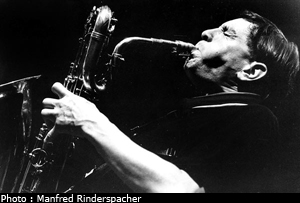
The French saxophonist Daunik Lazro combines a tart, piercing tone with a quick mind, and flexible philosophy of music-making. His professional start was in the bassist Saheb Sarbib’s orchestra, a relationship he maintained through most of the ’70s, including three recordings.
His first steps playing his own music involved a radical resizing of the cast on stage, going from orchestra playing to solo saxophone concerts and duets. In the ’80s he busily played with many on the European improvised music scene, including bassist Jean-Jacques Avenel, cellist Tristan Honsinger, violinist Carlos Zingaro, drummer Christian Rollet, saxophonist Evan Parker, trombonist George Lewis, bassist Joëlle Léandre and pianist Irène Schweizer.
In the mid ’80s Lazro expanded his partnerships to include dance and theatre projects. He formed a particularly fine trio in 1987 with fellow saxophonist Michel Doneda and the brilliant percussionnist Lê Quan Ninh, playing at many of the major European festivals and also touring in Canada.
Duets with the American free improviser Joe McPhee are a 1991 discographical highlight. In 1993 he started a quartet called Outlaws in Jazz with Jac Berrocal, Didier Levallet and Dennis Charles.
In 1995 he toured Europe in a triple threat combination with both McPhee and Parker, and the former artist also joined him in a quartet the following year with the superb British bassist Paul Rogers.
In 2000, he recorded « Zong Book » a solo album on alto and baritone saxophones. During the last decade he recorded and performed with the electroacoustic duo Kristoff K.Roll, vocalist Phil Minton and with different quartets: Aérolithes (Michel Doneda, Michael Nick and Laurent Hoevenaers), Rekmazladzep (Thierry Madiot, Dominique Répécaud and Camel Zekri), Qwat Neum Sixx (Sophie Agnel, Michael Nick and Jérôme Notinger).
POURTANT LES CIMES DES ARBRES (DT 01)
SENS RADIANTS (DT 04)
• • • • • • • • • • • • • • • • • • • • • • • • • • • • • • • • • • • • • • • • • • • •
French double bass player, improviser and composer, Joëlle Léandre is one of the dominant figures of the new European music. Trained in orchestral as well as contemporary music, she has played with l’Itinéraire, 2e2m and Pierre Boulez’s Ensemble Intercontemporain. Joëlle Léandre has also worked with Merce Cunningham and with John Cage, who has composed especially for her – as have Scelsi, Fénelon, Hersant, Lacy, Campana, Jolas, Clementi and about 40 composers.
As well as working in contemporary music, Léandre has played with some of the great names in jazz and improvisation, such as Derek Bailey, Anthony Braxton, George Lewis, Evan Parker, Irene Schweizer, William Parker, Barre Phillips, Pascal Contet, Steve Lacy, Lauren Newton, Peter Kowald, Urs Leimgruber, Mat Maneri, Roy Campbell, Fred Frith, John Zorn, Mark Naussef, Marilyn Crispell, India Cooke and so many others…
She has written extensively for dance and theater, and has staged a number of multidisciplinary performances. She got the DAAD at Berlin, is welcomed as artist resident at Villa Kujiyama (Kyoto). In 2002, 2004 and 2006, she is Visiting Professor at Mills college, Oakland, CA, Chaire Darius Milhaud, for improvisation and composition. Her work as a composer and a performer, both in solo recitals and a part of ensembles, has put her under the lights of the most prestigious stages of Europe, the Americas and Asia.
Since 1981 Joëlle Léandre has about 160 recordings to her credit.
http://www.joelle-leandre.com/
THE BILL HAS BEEN PAID (DT 03)
• • • • • • • • • • • • • • • • • • • • • • • • • • • • • • • • • • • • • • • • • • • •
A passion to play, in the mere sense of the word, a craving for music which leads to embrace all kinds of music, unbiased and unrestrained.
A self-taught formation in the beginning make him discover chronologically rock, classical music, traditional and the «contemporary» music.
He studies at the Conservatoire National Supérieur de Music in Paris from 1996 to 1999, with Michael Levinas in the class of Musical Analysis and with famous jazz drummer Daniel Humair.
Student at IRCAM from 1995 to 1996.
Jazz music deeply influences his way of playing drums, more and more pushing him to free improvisation, and experimentations on sounds.
A band which allows him to gather all the forces that lead him and let him discover improvisation: Shubniggurath, his first recording in 1990.
He found his own label Quark Records in 2005.
With Das Kapital he won the Critics’ Price in Germany (Preiss der deutsche Kritik) in 2011.
In January 2011 he found his own quartet: Synaesthetic Trip with Benoit Delbecq, Bart Maris and Arnault Cuisinier.
Since then, many projects:
- Duo Calx (with Jean-Luc Guionnet),
- Big (Drum & Bass) and BIG POP (free pop band with Frederick Galiay on electric bass),
- Duo √2 with Jean-Pierre Drouet since 2008,
- Duo with Elise Caron (French singer and actress),
- Quintet Hubbub (Matchless records),
- Trio, Das Kapital with Daniel Erdmann (Germany) and Hasse Poulsen (Denmark),
- The Fish with Jean-Luc Guionnet and Benjamin Duboc…
Edward Perraud has played with: Louis Sclavis, Jean-Pierre Drouet, Joëlle Léandre, Michel Portal, Fred Frith, Marc Helias, Vincent Courtois, Claude Tchamitchian, Joe Rosenberg, Bruno Chevillon, Alan Silva, Andrea Parkins, Jean-Luc Guionnet, Paul Rogers, Dan Warburton, John Butcher, John Edwards, Johannes Bauer, Bernard Lubat, Daunik Lazro, Jean-Luc Cappozzo, Didier Petit, Camel Zekri, Lucia Recio, Olivier Benoit, Peter Scherr, Sylvain Kassap, Itaru Oki etc…
He recorded around 50 albums on various european, american and asian labels.
Many Tours all over the world, Usa, Canada, China, Asia, Europe…
Believer of self-denial a claimed evolution where everything has to be possible.
http://www.edwardperraud.com/
EN CORPS (DT 02)
• • • • • • • • • • • • • • • • • • • • • • • • • • • • • • • • • • • • • • • • • • • •
EVE RISSER
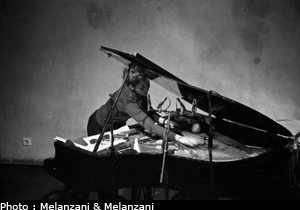
Eve Risser has her musical roots in chamber music as a flutist and pianist. While residing in Alsace, France, she merged in to the contemporary and jazz/improvised music world. In June 2008, she got the 1st Piano Price in Jazz & Improvised Music at National Conservatory in Paris, a soloist price at the International Competition of La Défense. From 2009 to 2013 she took part of National Jazz Orchestra of Fance (ONJ) directed by Danie Yvinec.
Eve’s multifaceted musical creativity has been heard in various settings, festivals and groups throughout the world.
She performs solo with piano or electric harpsichord and a her own improvisations or compositions. She leads and co-leads, plays, and composes in the Donkey Monkey with Yuko Oshima ; in the quartet The New Songs with the swedish singer and composer Sofia Jernberg, Kim Myhr and David Stackenäs ; in the trio EN-CORPS (Risser/Duboc/Perraud) ans many others.
Currently Eve’s musical life is based out of Paris where she is involved in organizing creative music live performances and the label UMLAUT. Eve has had the possibility to play and collaborate with great musicians such as John Hollenbeck, Billy Hart, Benoît Delbecq, Jon Irabagon, Mickael Formanek, Médéric Collignon, Marc Ducret, Emile Parisien, Jean-Luc Guionnet, Mickael Zerang, Andreas Werliin, joel grip, eivind lohning, Wolfgang Mitterer, Quatuor Bela, MAGMA, Le Sacre du Tympan, Magnetic Ensemble, The Bridge #5, les solistes de l’Ensemble Intercontemporain Nicolas Crosse & Pascal Gallois, Pascal Niggenkemper Vision 7 and many others.
http://www.everisser.com/
EN CORPS (DT 02)
• • • • • • • • • • • • • • • • • • • • • • • • • • • • • • • • • • • • • • • • • • • •
